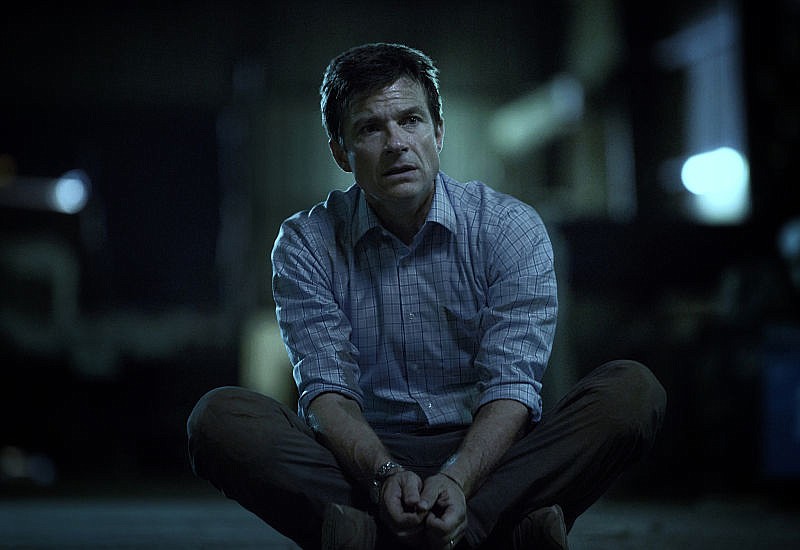NEW YORK (AP) -- In his new drama series "Ozark," Jason Bateman doesn't aim to make waves as Chicago financial adviser Marty Byrde -- more like ripples that leave no one around him untouched or unexposed.
When not advising clients on their 401(k) plans, Marty launders cash by the millions. But now he's jammed up with the South American drug cartel he cleans that money for. So he and his family bolt for the Missouri Ozarks, a safer base of operations where he hopes to make things right before the Byrdes end up dead.
The intoxicating saga that powers the 10 episodes of "Ozark" (just released on Netflix) is full of unexpected twists and is fortified by a splendid cast including Laura Linney as Marty's accomplice-wife and the mother of their two kids.
The drama churns around Marty, yet, for Bateman, this starring role was just his means to a more compelling end: The role of director.
At 48, Bateman began his acting career in childhood on "Little House on the Prairie" and "Silver Spoons," and is perhaps best known as a member of the flakey Bluth family on the cult comedy "Arrested Development." (Next month, he reunites with his fellow Bluth loonies to shoot a new cycle of the series for Netflix.)
But after decades on camera, Bateman found an even greater passion. He directed (not just acted in) a pair of features: "Bad Words" (2013) and "The Family Fang" (2015). He wanted more of that.
That's where "Ozark " came in. He signed on as its executive producer with plans to direct all 10 episodes. (This proved logistically impossible; he directed the four that bookend the season, passing the reins to others for the middle six.) His acting job was secondary. The chance to direct "was the draw," he says. "That's what got me vibrating."
A yearning to direct? What actor doesn't hear that siren call?
But what makes Bateman's case a bit different is his attitude toward acting, and how, in "Ozark," that less-is-more policy informs his performance.
Though slammed with one fearsome challenge after another, Marty responds in mostly microscopic ways. The audience can tell things eat at him, but it's mostly buried deep beneath the surface. Marty seems so disconnected from his feelings, the viewer is obliged to do the connecting for him, to fill in the blanks Bateman sketches out. The viewer is summoned to help Marty feel.
This is Bateman's kind of role.
"The characters that I'm always drawn to play is 'us,'" he says -- "as a proxy who shapes the experience for the audience."
Even in his signature role on "Arrested Development," his character, Michael Bluth, serves as the audience's surrogate -- the sanest member of this clan who shares and shapes viewers' wonderment at the lunacy whirling around him.
"Acting changed for me a while ago when I started to become disenchanted with pretending to be other people," Bateman says. "I'm not interested in tricking you into thinking I'm somebody else. My challenge with acting has now changed into a different goal: to give me another hand on the wheel, along with directing, to steer the audience through the story."
It seems like heresy: The notion that an actor isn't always playing let's-pretend, and wouldn't want to claim the spotlight at every opportunity.
"I'm trying to not do ANY acting," Bateman insists. "I'm trying to be not distracting at all. I don't want to rock the boat. I don't want to do anything where the audience goes, 'Oh! Look at that performance!' I'm just trying to service the story. I'm trying to be as natural" -- a long, contemplative pause -- "and invisible as possible."
Or, put another way: "This ISN'T Daniel Day-Lewis work," he says with a smile.
Suffice it to say, Bateman didn't study money laundering or consort with drug kingpins to prepare for playing Marty Byrde. And when asked if he had any prior interest in the underworld economy, he says, "None. And I'm still not really sure what it means."
Instead, his preproduction efforts were focused on un-actorly details, from casting and crew to locations, once he was roped in by Bill Dubuque's ("The Accountant," ''A Family Man") scripts.
Shooting began a year ago, with Atlanta-area lakes Lanier and Allatoona mostly subbing for the Lake of the Ozarks.
In getting the portrayal of Marty he wanted, "I basically had a robot at my disposal in front of the camera who was reading my mind on every scene, every take," Bateman says. "He could make surgical adjustments that I might have found very, very difficult to articulate to someone else. And there was ZERO creative negotiation necessary with that 'robot'!
"It's been the best experience of my life," Bateman sums up. "I've had a long career and a lot of jobs that I've absolutely loved, and this is A-No. 1, for sure."
He hopes for a quick go-ahead to start preparing another round of episodes. And as producer-director, he knows his leading man is all in.
"Marty is a character that is definitely a part of me, and I'm good friends with that part of me," says Bateman. "When I need him, I know he'll be around."

